Table of Contents Show
Full-Time RVing has exploded in recent years. It seems everywhere you look someone is selling a house to live in an RV. Is it right for you?
Today, we will look into the pros and cons of selling your house to live in an RV so you can make an informed decision.
Selling House to Live in RV: Should You Do It?
While it may sound good on the surface, selling your house to live in a motorhome or travel trailer isn’t all Instagram-worthy. RV living is a wonderful journey, but you should consider the pros and cons of such a significant decision before jumping into it. You don’t want to sell it all only to realize you shouldn’t have.
Essentially, it’s your decision. You need to weigh the pros and cons before making that choice, so we wanted to offer some pros and cons of selling your house to live in an RV to help you decide.
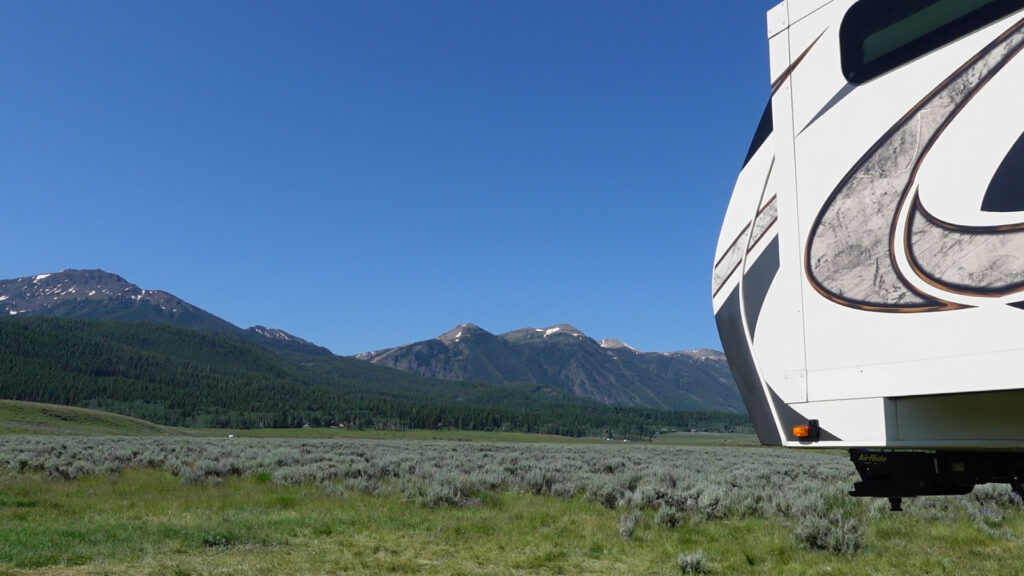
Pros of Selling Your House to Live in an RV
Living in an RV has some seriously great benefits. Regardless if you’ll be traveling or staying stationary, it provides a whole new adventure. Here are some reasons why you should sell it all and live in an RV.
Your Home Is on Wheels
One of the biggest benefits of living in an RV is its mobile capabilities. Don’t like where you are? Move to a new spot. Neighbors driving you crazy? Find a new park. Having a home on wheels allows you to move your entire home without packing all your belongings like in a sticks and bricks house.
It Can Be Cheaper
Mortgages can quickly eat up your entire paycheck. It can easily feel like you’re working just to pay the mortgage. RV living can be dramatically cheaper with enough planning and sacrifice. Many people choose to live in an RV while they save money for their next house. Others prefer an RV because it frees up their funds for more adventures.
You’ll Buy Less Stuff
Living tiny means there’s only so much room for extras. When you don’t have massive cabinets or closets, you can’t just shove stuff into them. It’s less tempting to spend money on random things you don’t truly need when you don’t have a place to store them.
Ultimately, it helps you live more minimally. When you get in the habit of spending less money on unnecessary stuff, you free up funds for experiences instead of more things.
You Can Still Live in the Same Town
You don’t have to be mobile just because you live in an RV. Many choose to remain stationary in their RVs. Stationary full-time RVing is something worth considering! Not everyone can leave their jobs and hit the road, but that shouldn’t prevent you from living the RV life if it’s right for you. Even if you need to stay in a specific town or city, you can still move parks if the scenery starts to get a bit stale.
You Can Travel Full-Time and Take Home with You
If traveling is what your heart seeks, living in an RV is a great way to do it. With full-time RV living, you can wake up in a new location every day but sleep in your bed every night. It’s amazing to travel the country and have all of the comforts of home. Traveling in an RV gives you the stability of a home while still allowing you to satisfy that adventure bug.
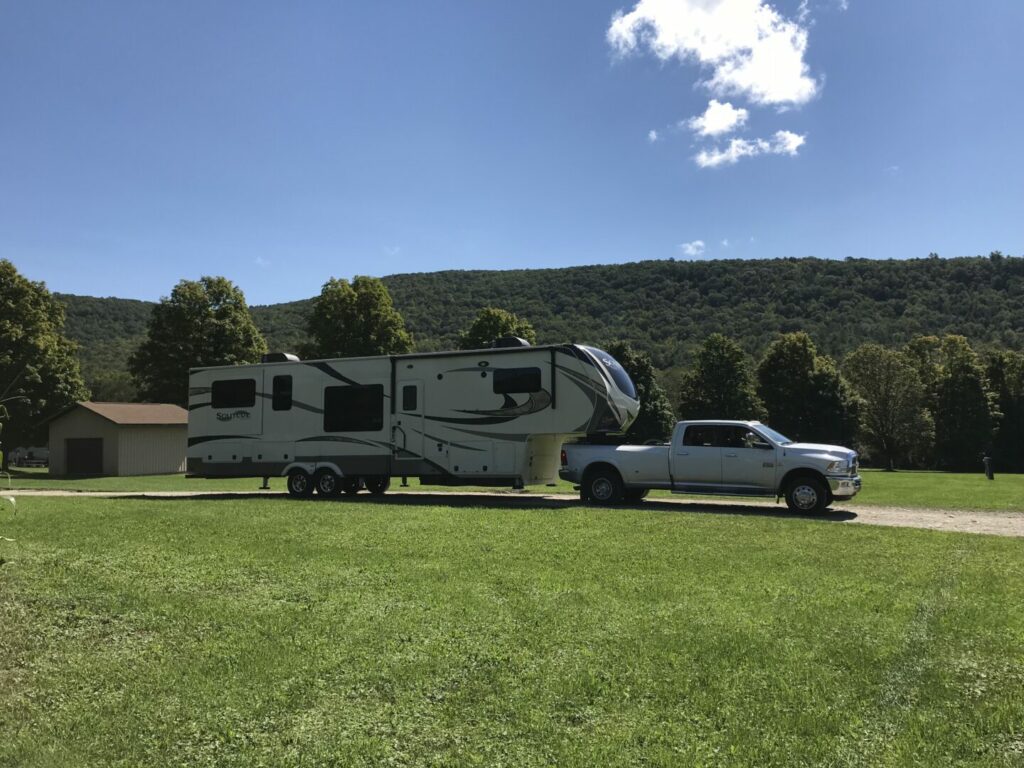
Cons of Selling House to Live in RV
RV living isn’t for everyone. There are many cons to this lifestyle, and it’s essential to understand the bad before you jump into it. If any of these things are deal-breakers for you, you may want to reconsider selling your house to live in an RV.
It’s a Very Small Space
Some RVs may seem massive, but in the end, all RVs are relatively small. Even the largest can feel cramped, especially on rainy days. Storage can be tough to navigate and is often difficult to keep organized.
While cleaning can be faster, an RV can quickly feel messy due to the tight space. Unfortunately, small spaces can cause tension in relationships in some cases, and it can wear on you more than usual.

You Might Not Even Like Living in an RV
Some people sell it all and move into an RV without ever having been in one. It may all sound like a fun adventure, but once you get in and get settled, you realize you aren’t happy. If you’re unhappy with your living situation, it will likely make you miserable.
Many new full-time RVers suddenly realize they don’t even like living in the RV. It’s best to try the lifestyle out before jumping all in.
You Have to Deal with Your Own Waste
Many people forget that most RVs are not tied directly into a septic system in the same way houses are. Even if you have a full hookup spot, you’ll need to deal with your waste at some point. If you’re traveling, you’ll need to deal with it a lot more, as you’ll be routinely pulling out hoses and hooking up to a sewer each time you move.
Pro Tip: Are you sure the RV lifestyle is for you? Read 5 Worst Things About Full-Time RV Living to see if you can handle the worst!
Things Break A Lot
There’s a saying in the RV world that either something is currently broken or will break soon. When you live in an RV, your home rolls down the interstate and experiences earthquake-like movements regularly.
Many rigs are for recreational use only, not full-time living, so they have more problems when people use them full-time. You’ll need to be pretty handy (or be willing to become handy) unless you want your RV to spend days at a time in the shop.
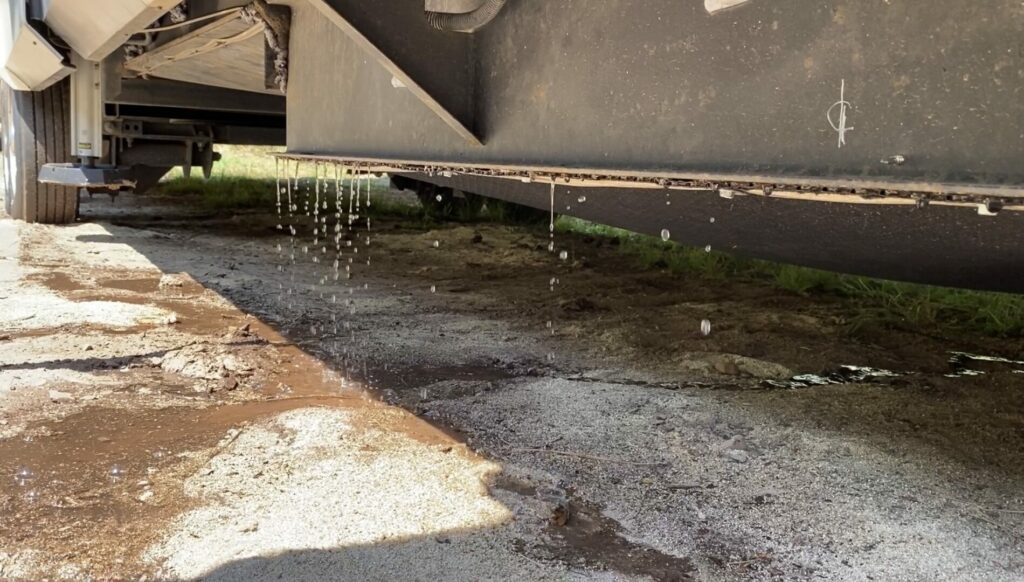
It’s Not as Glamorous as it Seems on Instagram
Not everything on Instagram is glamorous, but it can often feel that way. We tend to share only the best of the best with the world, yet reality can sometimes pale in comparison. Behind every beautiful adventure-filled photo are plenty of mishaps. Travel days can be stressful, hookups fail, problems arise, and adventures can be lackluster.
Traveling full-time in an RV can open up many amazing experiences, but plenty of frustrating moments accompany them. These are the moments you don’t often see on social media.
It Can Be More Expensive Than Sticks-and-Bricks Life if You Aren’t Careful
When RVers refer to a sticks-and-bricks home, they mean a traditional stationary house. It’s easy to assume RV life will be dramatically cheaper than a traditional home built with sticks (wood) and bricks.
RV costs can easily add up, especially if you’re traveling. The added cost of fuel, a tow vehicle (if necessary), campgrounds, and extra insurance can cost you more than a traditional home.
If the Pros Outweigh the Cons, You Know What to Do
Every big decision comes with some fear. Only you can determine if the pros outweigh the cons when deciding whether or not to sell your house and live in an RV. If you think it’s the right choice for you, and you can push past the fear, you’re in for a rewarding experience! There’s no shame in enjoying your time as a weekend warrior if it isn’t for you.
What do you think are the biggest pros and cons that come along with selling your house to live in an RV?


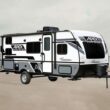


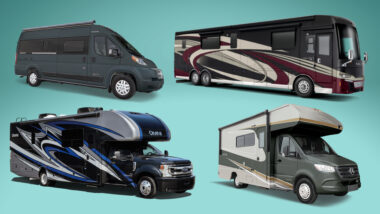

RVing is fun and we enjoy it. We do like reading your articles for the most part.
First most vloggers and bloggers, such as yourselves, promoted only the great life it is. Making it sound so adventurous, fun, and romantic in its own way. Click on our videos as we share how much fun it is so we can make a few bucks. Now bc of how things have changed (and everything changes eventually), the same vloggers and bloggers are portraying more the bad and some recommending not to do it while they continue to. Mostly bc the vloggers and bloggers are bent bc everything changed and feel the new RVers are encroaching on their turf that they promoted the hell out of. Maybe from the beginning the bad should have been documented alongside the good.